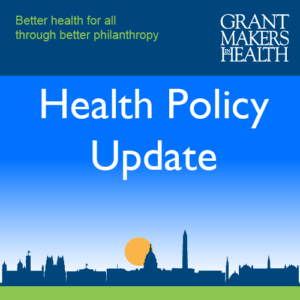Health Policy Update: May 27, 2025
In an effort to help our Funding Partners better understand the changing health policy landscape in the new administration and Congress, Grantmakers In Health (GIH) is expanding the GIH Health Policy Update newsletter to three issues per month. Working in collaboration with Leavitt Partners, a leading health care policy consultancy, we are adding new installments of the newsletter on the first and third Wednesdays of the month, while we will continue to partner with Trust for America’s Health on the installment released on the second Wednesday of the month.
More Coverage, Better Care: Improving Children’s Access to Health Services
Children’s access to health care has been a longstanding policy issue, with strong bipartisan support for expanding insurance coverage and redesigning the health care delivery system in ways that benefit young people. Despite enormous progress made over the past two decades, however, millions of children remain unable to obtain needed health services. This Issue Brief covers how the current health care system succeeds and fails for children, emerging policy developments, what grantmakers are currently doing to promote children’s access to health services, and lessons learned to help guide future work.
Preparedness or Panic: Resources for Grantmakers
Basic public health infrastructure is essential for effective preparation for and response to emergency events. This resource guide is designed to help grantmakers working at the local, state, and national levels better understand how they can contribute to strengthening the public health system, as well as become more proactive in their efforts to prepare for and respond to emergencies.
Foundations and the Media
Local and national media outlets can help grantmakers inform and educate the public about important health issues and promote the work of their grantees. For many foundations, however, working with the media is uncharted territory.
Partnering to Improve Public Health
The public health system is the nation’s first line of defense against many threats, both naturally occurring and manmade. It ensures the public’s health and safety by identifying and tracking disease, protecting food and water supplies, educating the public on a variety of health issues, and responding to disasters.
For the Benefit of All: Ensuring Immigrant Health and Well-Being
This Issue Brief explores the unique health, social, and policy issues that affect immigrant populations; it looks at attitudes toward immigration and how these influence support for social programs and the provision of public benefits; it highlights philanthropic activities to improve health care access and coverage for immigrants and their families; and discusses how grantmakers are working to ensure the health and well-being of immigrants in their communities.
In Harm’s Way: Aiding Children Exposed to Trauma
Every year, thousands of children nationwide experience trauma as a result of exposure to violence, abuse, natural disasters, severe illness or injury, loss of loved ones due to violence or accident, or forced relocation. This exposure can have both immediate and long-term effects on children’s health and their ability to function fully in their families, schools, and communities. This Issue Brief focuses on the needs of children exposed to trauma, strategies for early identification and intervention, and ensuring the provision of timely and appropriate services to them and their caregivers.
Join & Become a GIH Funding Partner Today!
Click here to learn more about becoming a GIH Funding Partner and joining the largest national network of health funders.

